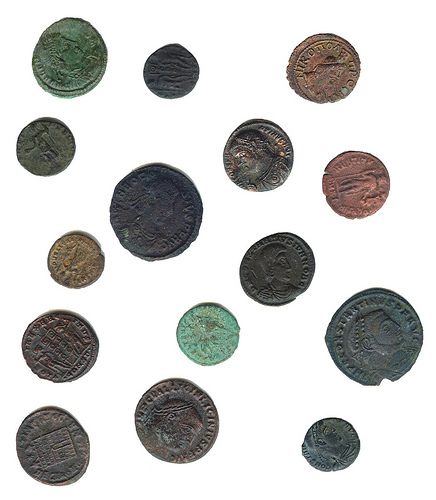Revised Common Lectionary Reflection, Twentieth Sunday after Pentecost, Year A
October 18, 2020

Lessons: Isaiah 45:1-7; Psalm 96:1-9, (10-13); 1 Thessalonians 1:1-10; Matthew 22:15-22
Theme: God’s faithful and generous people acknowledge that everything comes from, returns to, and belongs to God. Our job is to be faithful stewards of divine abundance.
Key Scripture: Then he said to them, “Give therefore to the emperor the things that are the emperor’s, and to God the things that are God’s.” – Matthew 22:21b
It was a trap, a brilliant political move actually. Temple leaders from the Pharisees and Herodians have already gotten on Jesus’ last nerve, the result being a series of three increasingly apocalyptic and violent teachings. Now they’re back, this time sending a delegation with false flattery and a question they feel certain will stymie this radical rabbi who is causing them so much trouble. Oh, they should have known better—just as we should know better today.
What a timely lesson we have before us this week, just 16 days before our country experiences a highly polarized and important election day (November 3). Just what do we give to the powers of this world and what do we give to God? Where does our primary allegiance lie? Why does this even matter?
Maybe a better question is how did Christians in this country become so polarized when it comes to the role of government and political affiliation? Don’t we follow the same Christ? I often wonder.
Jesus is pretty clear about what’s really important for those who want to follow him: “You shall love the Lord your God with all your heart, and with all your soul, and with all your mind.’ This is the greatest and first commandment. And a second is like it: ‘You shall love your neighbor as yourself.’ On these two commandments hang all the law and the prophets” (Matthew 22:37-40).
Some people find it easier than others to align their faith and discipleship to the rest of their life decisions, be they social, political, or consumer-oriented. Others find it more difficult. or they choose to segment their faith and public lives. Some folks straddle the middle quite comfortably. Still others spend considerable effort telling their pastors and other congregational leaders to keep politics out of the church. We can’t even agree on what it means to disagree!

Jesus’ response to these leaders out to get him is brilliant—and politically charged. When asked whether it is lawful to pay taxes to Caesar, he asks for a denarius, a coin of the Roman Empire. He then asks them whose image appears on the coin. Once they have correctly identified the emperor, Jesus says, “Give therefore to the emperor the things that are the emperor’s and to God the things that are God’s.” The entrapment delegation has no response other than amazement, and they leave without so much as a witty rejoinder.
Our job is not to tell parishioners what to believe or how to vote or what decisions to make about their life and consumption habits. Our job is to proclaim a gospel that’s often difficult, convicting, gnarly, and extremely uncomfortable for folks who sit in places of privilege. The good news of the Christ has its own way of working into our heart, soul, and actions, thanks to the Holy Spirit. I realize, too, that many of you feel caught between the proverbial rock and hard place, perhaps so much so that you feel your call could be in jeopardy if you preach a faithful word.
Yes, we live in the already and the not yet. God’s way is breaking into this world, but it’s not fully realized. Sin and evil are still very much a part of our daily lives. We Christians live in the world, but we are not to be of this world. We are not to allow our decisions to be swayed by the latest pundits, polls, or Tweets, and yet we so easily do.
Maybe better questions to consider (and good conversation starters) might include: Is my vote one that most faithfully reflects my faith and benefits my neighbors, or am I completely focused on my own needs and desires? When is it lawful/beneficial to pay taxes? Why? How can we all work together across the political chasm to love God and neighbor? Are my words and actions in line with the Eighth Commandment (and Luther’s explication thereof)? Do I love Jesus or my social media feed more? What do we share in common? How can we build bridges rather than tear everything apart?

Whatever tack you take with this week’s gospel lesson, may we all remember who we are and whose we are: We are beloved children of God and we belong to the Creator of all that was, is, and is to come. Yes, everything belongs to God. Our job is to steward these gifts of abundance faithfully, to love God and neighbor, and to align our faith with our actions. This is indeed a tall order, but with God all things are possible.
In
Worship
Give each worshiper a penny or invite worshipers to pull a
coin from their pocket or purse. Whose image is on the coin? What does it say?
Do we really trust God, or do we trust in our own abilities to manage life?
Imagine Jesus sitting among you today and telling you to give to the government that which is the government’s and to God what is God’s? How would you answer? Would you be tongue-tied and silent? Would you take issue with Jesus’ statement? Would you spend time praying and pondering over it? Finally, ask to whom our ultimate allegiance belongs? Are we living true to that reality, or do we play fast and loose with it figuring we can outsmart God?
Consider singing “This Little Light of Mine” this week. Here’s a simple YouTube version featuring Odetta. How can we let our lights shine for the good of the world, uniting for a conflagration of hope and possibility?
With
Youth
Whose are you? Consider this question with your youth in light of Jesus’
teaching in this week’s gospel. Do we belong to the world and the myriad
competing interests that vie for our attention and resources? Or, do we belong
to God who desires nothing but the very best for us? What does it mean to
belong to God in light of our baptismal promises and affirmation? How does
affirming that we are God’s influence how we live and make decisions?
Consider watching “Dust” from Rob Bell’s Nooma series. You can find it here.
With
Children
This week’s focus verse is Psalm 96: – Oh sing to
the LORD a new song; sing to the LORD, all the earth.
One of the themes of the Psalms, the Hebrew hymnal, is singing praise to God. This has been difficult because the COVID-19 pandemic has made singing in church a risky practice. Some of us still aren’t even back in our church buildings, and if we are it looks a lot different. To protect one another from infection we aren’t singing, and this is hard because we are built to sing and make music. So what can we do? Some people have put together virtual choirs and orchestras. Here’s one featuring 140 New York musicians singing “How can I keep from singing.” See if you can find the young girl singing with an adult. What musical instruments do you see? We can find ways to sing new songs. We can write lyrics. We can listen to our favorite songs and hymns. We can hum. Of course, we can and should wear our masks. But don’t worry. God built that impulse to praise and sing right into each one of us. It will still be there when COVID is gone.
Finish with a simple echo prayer and blessing.
Dear God (Dear God),
Thank you (Thank you) for the gift of music (for the gift of music). Thank you for teaching us (Thank you for teaching us) to praise you in song (to praise you in song). Help us to keep finding new ways (Help us to keep finding new ways) to worship and praise you (to worship and praise you). Keep us from fear (Keep us from fear). Keep us hopeful. (Keep us hopeful). Make us helpful (Make us helpful). Give us peace (Give us peace). Amen (Amen).
Weekly Stewardship Bulletin Insert
Our gospel lesson this week reminds us that no matter what earthly powers and principalities might want us to believe, all things come from, return to, and belong to God. Our work is to carefully steward the many gifts of God’s abundance.
Stewardship at Home
This week make it a goal to talk with someone with whom you know you have differences of opinion—politically and/or socially. Pray for God to open the way for a good opportunity. Remember to listen twice as much as you speak. Need some help with preparation? Consider reading Talking Across the Divide: How to Communicate with People you Disagree with and maybe even Change the World by Justin Lee.
After your conversation take some time to debrief. Did you both feel safe? Were you able to speak honestly without fear of being judged or harassed? Did you find any common ground? Did you identify any next steps?
2017 Reflection: https://www.stewardshipoflife.org/2017/10/belonging-to-god/
2014 Reflection: https://www.stewardshipoflife.org/2014/10/reframed-by-the-holy-other/
Note: Reprint rights granted to congregations and other church organizations for local, nonprofit use. Just include this note: “Copyright (c) 2020, Rev. Sharron Blezard. Used by Permission.” Other uses, please inquire: thewritelife@hotmail.com.



Leave a Reply